
Interview with Marion Kreß, Head of the Administration and Legal Department “We want as much flexibility as possible for our staff”
Chief HR Officer, Chief Financial Officer and General Counsel — in her position as Head of the Directorate General “Administration and Law” at the DPMA, Marion Kreß unites all these roles. In this interview, she talks about strategic challenges in recruitment, putting diversity into practice and the “House of Innovation”.
In May 2024, Marion Kreß took over as Head of Directorate General 4 (Administration and Law). She has been with the DPMA since 2005, when she joined the office as a legal advisor for personnel matters. After her secondment to the Federal Ministry of Justice she held positions as a legal examiner in the trade mark area and as a head of section in the trade mark department, and she was a head of section and finally a head of division for budget and organisation. Since then, she has also been acting as Chief Financial Officer. Marion Kreß studied law at the universities of Konstanz and Lausanne.
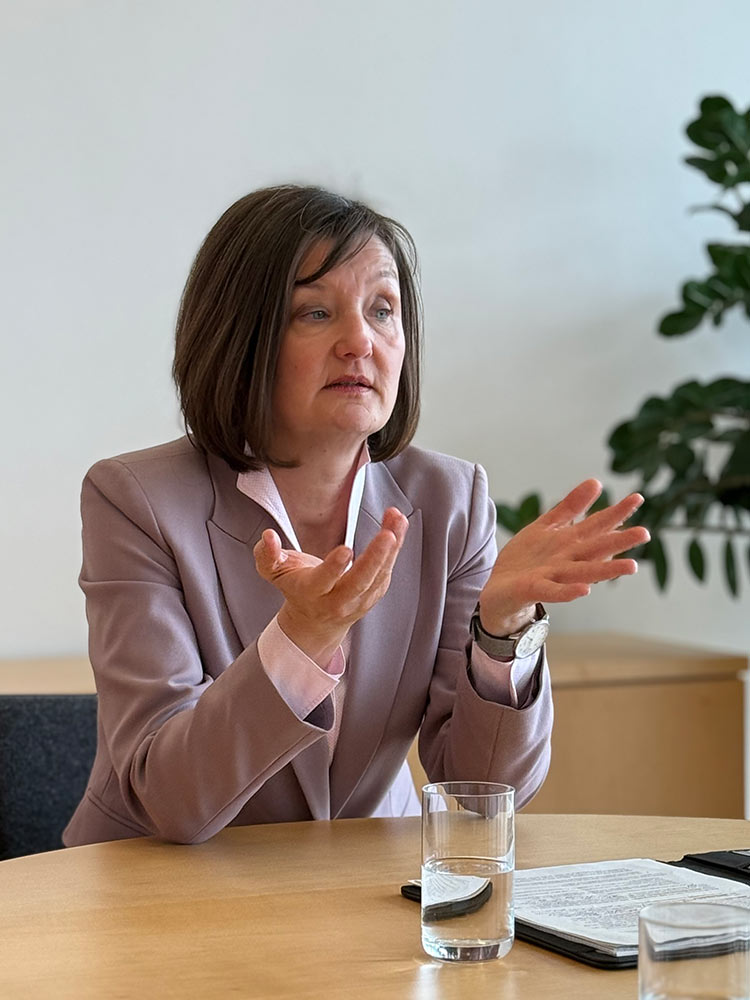
Miss Kreß, our ageing society is becoming more and more of a problem for the job market. The baby boomer generation is retiring. Does this worry you, as the DPMA’s Chief HR Officer?
Of course it worries us. And we are doing a lot to meet this challenge head-on. For us, this development means that we need to put even more effort into finding staff. We depend on highly-skilled experts, the same ones who also get wooed by international tech companies. But thanks to our innovative recruitment team we have already been very successful in the last few years.
Since finding new staff is becoming more and more difficult, we have to take especially good care of the colleagues already employed at the DPMA, so that they will want to stay with us, and provide them with career opportunities here. We want to offer interesting jobs and varied tasks and ensure a healthy work environment. The atmosphere at the DPMA is very open and makes people feel appreciated. If our staff endorses us as an employer, that is already a very effective way of recruitment.
What advantages does the DPMA offer its staff?
The DPMA offers a wide variety of job profiles and career paths. As a lawyer myself, I personally really appreciate the wide range of legal topics and areas where one can work: there´s the work with industrial property rights, the supervision of collective management organisations or positions concerning international relations, to name just a few.
Our patent examiners have a technical or scientific background and find exciting and meaningful tasks here. And they do not just work in solitude all by themselves. There is a lot of contact with the applicants as well as exchanges with other national offices, the European Patent Office, the EUIPO and WIPO. With the IP rights they grant, our colleagues make an important contribution to strengthening the competitiveness of companies.
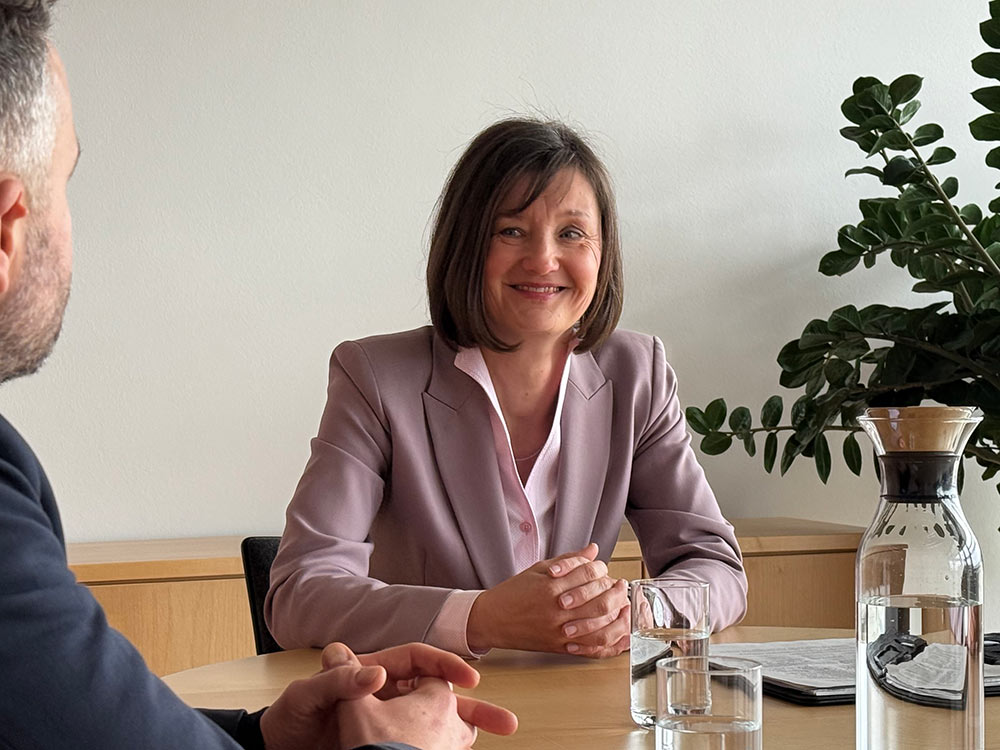
How flexible are the working hours and the work location at the DPMA?
We want as much flexibility as possible for our colleagues. In addition to flexible working hours, we also offer remote work options. This way we contribute to the work-life balance of our staff and enable them to work quite autonomously.
We also offer attractive part-time options, which is especially interesting for colleagues with family commitments, whether they have children or need to take care of elder relatives. This also applies to leadership positions. And if the personal situation as well as the situation at the DPMA allow it, the working hours can be increased again.
Employer attractiveness can also be obtained by creating a work environment that offers inclusion and diversity. How advanced is the DPMA when it comes to these topics?
Diversity is part of our culture and also — according to my own experiences — part of our daily life here. We have always had staff with diverse backgrounds, whether that concerns culture, religion or gender. We have staff with and without disabilities. That´s what makes us who we are, and what makes it so stimulating to work at the DPMA. Public authorities in particular should be at the forefront of cultivating tolerance and social participation.
Diversity has been put into practice here for a long time. And to communicate our mindset even more clearly to the public, we will sign the Charta der Vielfalt (Diversity Charta) this year. We also participated in a survey initiated by the Federal Ministry of the Interior that examines the situation at various authorities. We hope to get further insights from this, so we can meet the needs of our staff even better.
This year, the patent examiners moved to a new office building in the so-called Werksviertel in Munich — right next to start-up centres and new companies. How important is this innovative environment?
First of all, the new office building enables us to unite all patent examiners in Munich, who were previously spread across three buildings, in one location. And as the “House of Innovation” we fit seamlessly into the new neighbourhood, the vibrant and innovative Werksviertel directly behind the Munich East station — which also ensures perfect access to public transport! The new building can enhance the exchange and connection between our examiners in completely new ways. It offers a modern and inspiring work environment with many meeting points, but also room for focussed individual work.
Will the new office also be open to customers?
Yes, and we are looking forward to that, too. Apart from patent examinations, the new office will also host all hearings concerning patent and utility model proceedings. There will also be events taking place there, so the building will be accessible to a larger public.

In Focus Who actually knows about the DPMA?

For the first time, a representative analysis carried out on behalf of the DPMA at the end of 2023 provides insights into the level of IP knowledge among the wider public. A total of 1,830 persons were surveyed about different IP topics and the DPMA. The survey results provide the office with valuable data for strategic decisions.
With the extension of patent law, raising the awareness of the public and especially of small and medium-sized enterprises (SMEs) regarding the relevance of IP has become part of the official duties of the DPMA. As we strive to develop tailored information and event offerings, determining the knowledge level of these two groups concerning IP and IP rights is crucial to us. For this purpose, with the help of a market research institute, we carried out an awareness analysis. Based on their age, education and origin, a total of 1,830 persons were surveyed.
IP knowledge
We used an unaided open question and asked for an explanation to find out if the respondents knew the term “intellectual property” at all. The majority of respondents were able to use examples showing that they knew its meaning. About half of all participants even named specific IP rights and were able to explain the term in an abstract way.
Moreover, in a self-assessment we asked about the knowledge about rights protecting intellectual property. Only 8% of those polled from the general public indicated that they had relevant knowledge, whereas more than 60% indicated having only little knowledge or none at all. When it comes to enterprises, that is the B2B sector, our survey findings were more positive: more than 40% of those polled indicated that they had knowledge about IP rights and just barely 30% admitted knowing nothing or only a little.
Awareness regarding the DPMA and IP rights
Asking questions about the awareness regarding the DPMA was also part of the survey. This revealed that only 3% had been in contact with the DPMA before or had already used its services. Fortunately, as far as enterprises are concerned, a quarter of all polled answered in the affirmative.
On the average, about 44% of all participants knew the DPMA from the media. However, out of all respondents, more than half of those coming from the general public and almost 30% of enterprises indicated that they did not know the DPMA at all or only by hearsay.
A particularly pleasing survey finding is the public awareness regarding the DPMA’s diverse IP rights. The large majority knew about the eponymous IP rights “patents” and “trade marks”. As far as enterprises are concerned, the distribution was quite similar and the awareness was even slightly higher.
On average, designs and utility models were also known by half of all respondents — with significantly less knowledge among those coming from the general public than among enterprises.
Satisfaction with the services of the DPMA
Out of all respondents, only those having indicated in a previous answer that they had used the services of the DPMA before were surveyed about their satisfaction with its services. Among the public, there were only very few DPMA users, which made it impossible to get a valid individual analysis.
In the B2B sector the users’ overall cumulated satisfaction with the DPMA was much more pronounced (95%) — about half (51%) were even very satisfied. Positive survey results were received especially from enterprises (100%), science (100%), IP users (97%) and start-ups (93%).
Utilisation and outlook
The awareness analysis delivered helpful insights that we can use in many areas of the DPMA. In particular, they are part of a comprehensive communication concept that we will complete in 2025. We will use it to review existing information and event offerings, which will then be adapted to our users’ needs. Moreover, we will develop new communication formats. As of today, in order to examine how the knowledge level about IP has developed, we plan to carry out the awareness analysis once more at a later date.

In Focus IP rights briefly explained
“Complicated” is a thing of the past! In our explainer videos, we cover complex topics regarding IP rights in simple and clear terms. In less than three minutes, you get straight-forward answers to important questions. It is digital, compact and tailored to the target audience: our YouTube channel has a lot to offer!
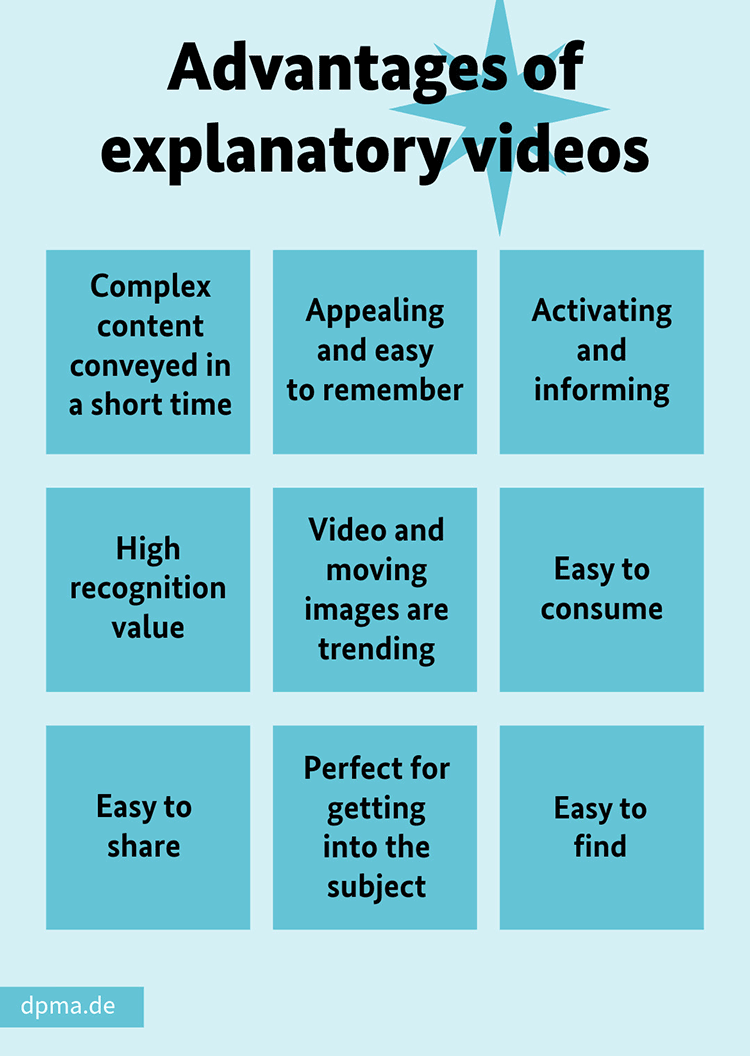

IP rights are all around us — in the form of patents, utility models, trade marks and designs. But the granting of an effective IP right involves a lot of technical terms, examination procedures and legal requirements and often seems to be very complicated. This is where our explainer videos come into play: they cover complex topics in an understandable, compact and visually pleasing way, so that everyone wishing to have their idea protected can quickly find all necessary information.
Our explainer videos shed light on a variety of topics. In less than three minutes we give clear, straight-forward and precise answers to frequently asked question — without any legal jargon, but with all the necessary know-how. Whether covering basic information such as “What is a trade mark?” or “How much does a trade mark application cost?” or more specific subjects like “How do classes for goods and services work?”, our videos do not require any previous knowledge and provide viewers with all the information they need to successfully protect their ideas.
The trust in this digital format has paid off: our first explainer video “Four IP rights everyone should know” already has more than 10,000 views. The following videos concerning trade marks together have more than 12,000 views — a clear indication that making information available is important. In 2024, the first patent video was added. It was well received and expands our offer. The video provides a compact overview of the strengths of the German patent system, from the excellent examination quality to the strategic use in disputes. Our videos are complemented by a post from the patent information centres, which act as an important trusted partner and central point of contact for consultations and searches.
Our explainer videos are part of the DPMA’s comprehensive project for providing digital information. They are produced in cooperation between the specialist areas, the internet editorial office and the social media team. This interdisciplinary collaboration ensures that the content is accurate, but also suitable for the target audience and presented in a visually attractive way.
In addition to their long version, there is also a short version available for all videos, which were specifically created for the use on platforms like YouTube Shorts or LinkedIn. These target users who need information in an even quicker and more compact format.
All videos are freely available on the DPMA’s official YouTube Channel as well as on our website. All of them offer the option of English subtitles. Please feel free to see for yourself!

Insight Technology Day: understanding trends, re-assessing the inventive step
To mitigate climate change and fulfil fundamental needs such as housing, heating and mobility with renewable energy sources: these are some of the biggest challenges of our time. In order to make competent decisions on the patentability of innovations, the Technology Day provided our patent examiners with further training regarding green technologies. Knowledge building at the DPMA with external experts: focused, fresh and very interactive.
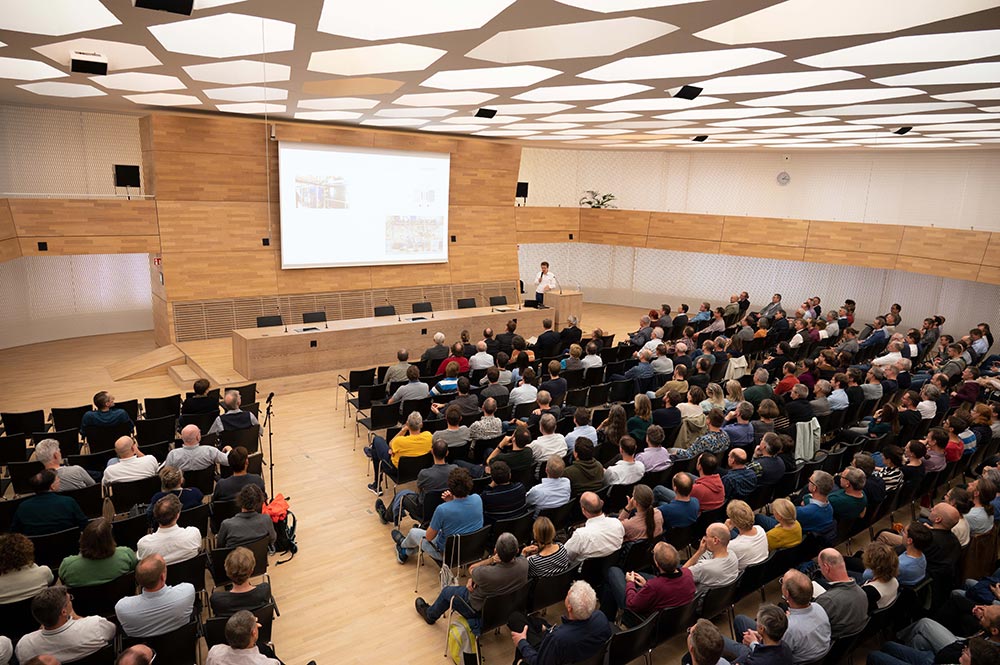
“We wanted to create more awareness for the crucial paths to a sustainable and decarbonised world with renewable energy sources. And we succeeded,” said Justus Kruse in the aftermath of the Technology Day in October. The patent examiner and assistant to the head of the Directorate General 1 “Patents and utility models” was responsible for the programme, the speakers and the organisation. The training day for patent examiners, which was open to all of the DPMA’s areas and had around 300 participants, covered not only the technical challenges of the energy transition, but also political factors and the necessary legal framework.
Think systemically and explore the details
From a brilliant idea to a marketable solution, multiplying the value for the economy and individuals alike with IP rights: Prof Oliver Mayer of Bayern Innovativ calls for more courage to take entrepreneurial risks and for combining systemic thinking with details. He also gave an overview of the practical usage and the relevance of certain approaches, from agrophotovoltaics, which combines cultivating fruit on agricultural land with the production of solar energy, to geothermal energy and solar panels swimming on quarry lakes. Further solutions to the energy transition which were presented by company representatives were power-to-heat, where electric energy is converted into heat, and flow batteries for remote energy storage. The Technology Day concerning green technologies offered infotainment at its best: there was a lot of laughter, many discussions and quite some debates about technical details.
At the Technology Day, experts from companies, associations and institutes contribute their expertise and their perspectives concerning current as well as cross-sectional topics, from great paradigms to tricky details. In 2024, the focus was on green technologies, in the year before everything was about robotics. Before the break due to COVID-19, some key themes on the agenda were lightweight construction and interconnectivity.
Deputy Director General of the Physics Cluster in Directorate General 1, Detlev-Georg Schmidt-Bilkenroth, sums up last fall’s event about green technologies as follows: “We have seen that even small details that seem obvious at first can lead to good solutions. This is definitely something to consider when assessing the inventive step.”

At a glance Personnel and finances
The DPMA had a total of 2,836 staff at the end of 2024 (+ 1.5% compared to 2023).
In 2024, 40.0% of management positions at the DPMA were held by women.
In 2024 we hired 113 new staff.
The proportion of part-time employees in management positions was 16.2 %.

IT specialist

Media and information services clerk

Electrician for power and building services engineering

Management assistant in office communications

Carpenter

Administrative employee
A total of 39 trainees in 6 skilled occupations offered by the DPMA in Munich.
Further training
4.3 training days were used on average by staff for personal further training in 2024.
Income and expenditure
Breakdown of income by type of IP
Total expenditure DPMA €266.1m in 2024
Career at the DPMA
Are you looking for a new career venture? Are you interested in a varied job with a wide range of development opportunities at the cutting edge of technology? At the same time, you would like to be able to balance work and personal life?
As a federal authority, we have a lot to offer to you — both as a central provider of IP services and as a family-friendly employer with flexible working hours.
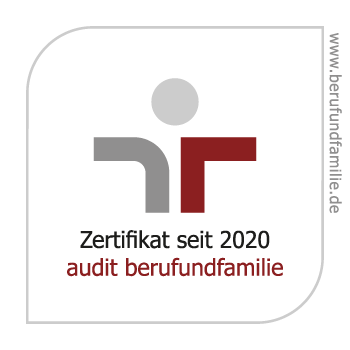
Information on job vacancies for the Jena location as well as on other interesting employment opportunities at the DPMA is available on our website under “Career”. Subscribe to our RSS feed so that you won’t miss out on any advertised job vacancies.